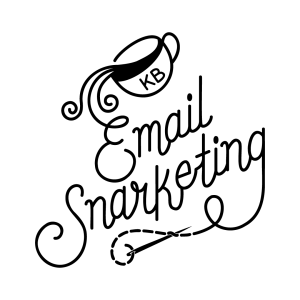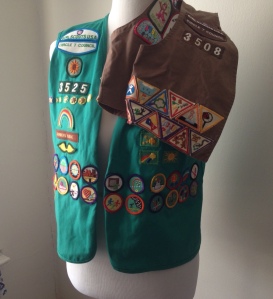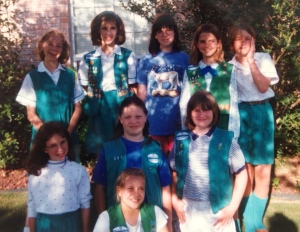It’s the end of the year, and you’re probably working on your performance review self-evaluation and/or setting goals for next year. I’ve had people ask me about the best ways to go about this since I’ve led several email teams in my career, and I thought it would be a good time to write about it.
Your HR probably showed you some slides during a meeting a few weeks ago telling you to make your goals S.M.A.R.T!!! (Specific, Measurable, Achievable, Relevant, and Time-Bound). And while that’s a great concept, it’s not always super clear how to translate that into actionable things you can do, and then later evaluate yourself on whether you “Did not meet expectations”, “Sometimes Met Expectations”, “Met Expectations”, “Sometimes Exceeded Expectations” or “Far Exceeded Expectations”. (Seriously, can we please stop using these 5 point measurement systems??? It is so confusing, and unless you and your manager specifically outline the difference between each level, it’s very hard to justify the highest ones. That’s what they want, by the way. Ever had a company say “Almost NO ONE gets Far Exceeded!!!” We expect most people will fall in the ‘Meets’ or ‘Sometimes exceeds’ bucket, and only have space for a few top performers?” That’s how they justify not giving raises. Because they surely would WANT to have most of the staff performing well, just not when it comes to handing out pay bumps. At least… in my experience at some jobs in my past. Anyway.)
So how DO you set goals where you can actually confidently say your work “Far Exceeds Expectations” when you do your performance reviews? How do you make it indisputable that you deserve a raise and/or a promotion? And what if your work isn’t necessarily as quantifiable as some email work? (For instance, if you work in B2B and your emails support sales, but aren’t the primary contributor because sales reps are closing the deal, or maybe you’re at a non-profit and sending newsletters that are more about awareness and not so much about fundraising, you can’t easily use the “My work generated this much revenue” goal.)
Here are some things you can set goals around that aren’t revenue related, how to make them S.M.A.R.T., and how to go above and beyond (and prove that you did!):
- Work Quality/Accuracy: Have you had email mistakes and “Oops” emails happen? (Of course you have. You send emails.) Set a goal around improving QA and reducing mistakes. The way you accomplish this goal could involve better documentation, a checklist, a specific new review process, adjustments to the production process to allow for more review time, etc. It’ll depend on a lot of variables based on your company/work, but spend some time thinking about where things have gone wrong in the past, and then make a plan of how you want to fix it in the future.
Your goal can then be something like: “By [date], I will create a QA checklist for our emails to reduce errors by X%, and I will present it at [whatever team meeting] and implement it for all emails.”
Specific: The actual deliverable is you’re making a checklist and presenting it
Measurable: Did you create the document? CHECK! Did you reduce errors? DOUBLE CHECK! A note on this – you’ll need some kind of benchmark to know if you actually reduced errors. So you’ll need to dig up how many mistake emails you had this year (maybe that’s a spreadsheet that lists them all and what the mistake was, maybe it’s some other format. You do you. But you need a baseline so you can show you’ve improved.)
Achievable: It’s just a checklist, and there are plenty of resources out there with ideas for what to include
Relevant: Hello, you need this and it’ll help your team do your jobs better!
Time-bound: You gave a timeline for when you expect to complete it
So how do you make sure you “Far exceed expectations” on that one? Deliver it WAY before your deadline. Make it extremely detailed and work hard to get full adoption from the team. Be a loud champion for your new process to the point where your coworkers maybe tease you about it a little bit, and try to get buy-in from higher ups so they also help with getting everyone on board with it. Before making the goal, quantify the number of mistakes you had last year, and show that after your new process was implemented, it actually helped reduce mistakes, ideally more than the percentage you laid out in your goal. BOOM! - Process improvements: Is your workflow chaotic? Are you constantly chasing feedback, that last bit of content, or approvals? Fix it! There are lots of ways to approach that, and again it’ll depend on your larger team and the work you’re doing, but think about where the hiccups and roadblocks are, and what could fix them.
Your goal can then be something like: “By the end of Q2, I will create and implement an email brief document and request process to streamline email creation and shorten production time from [X days – current amount of time it takes to get an email out the door] to [Y days – a much faster/shorter amount of time]”
Specific: The goal here is twofold. You’re creating the process and email brief/request form, but you’re also actually using it to shorten production times.
Measurable: Did you create the process? Cool, nailed it. Did it quantifiably reduce production times? Great!
Achievable: You can do this! Again, lots of examples and templates exist, and if you’ve been making emails, you know where the pain points are, so focus on fixing them.
Relevant: This literally helps you do your job more efficiently!
Time-bound: By the end of Q2 (this can be for whenever you want, but I like to space out my bigger project goals like this so I’m not trying to do everything at once)
How to show you exceeded the goal: Finish before your deadline, make the production time changes even better than you outlined in the goal, and show that there’s positive feedback from team members on the new process (scroll down to see a plan for how to do that…). - Brand work: Are you going through a rebrand? Designing and building new email templates? Developing an email style guide for your brand? Awesome! As you know, that’s a huge project and probably not easy to quantify. This could be an entire post on its own (by someone else who designs things…), but this totally warrants its own goal.
Your goal can then be something like: “By the end of Q3, I will design, code, and QA a modular email design system with # different modules, and migrate [the monthly newsletter, the onboarding series, whatever your first emails to migrate over to new design will be] to the new templates to improve email engagement and reflect new branding.”
Specific: Shows exactly what you’re doing – designing and coding the design system
Measurable: Quantifies how many modules will be part of the design system
Achievable: Make sure you’re giving yourself plenty of time, and that you have appropriate resources for this (maybe you’re not designing AND coding, but rather working with our team members who will do those parts. Maybe you’re more of a project manager/strategist for this – that’s okay too!)
Relevant: Maybe your company recently changed their logo or color palette and your emails need to reflect it.
Time-bound: Give yourself plennnnnnty of time for this one.
How to show you exceeded the goal: Do more or do it faster! More modules, or move more emails over to the new template. Or, be ahead of schedule. - Learning and developing new skills: We all know that email is constantly changing, and there’s always something new to learn. Whether it’s a new feature or tool in your ESP, a skill you’ve always felt a little shaky on, a certification, or even something else that can help you in your career like public speaking, setting aside time to work on this -and making it part of your job- is a great way to get there. Many companies have professional development budgets that rarely get used. If you have it – use it! Take that class, sign up for that certification test, or go to that conference.
Your goal can be something like: “By the end of the year, I will study for and earn the SFMC Email Specialist Certification.”
Specific: This is a very specific certification, with clear steps to achieve it.
Measurable: It’s pass fail, so pretty easy to confirm if you did it!
Achievable: You can do this! There are plenty of training courses and study guides available for this. Put in the time, and you’ve got it!
Relevant: If your ESP is SFMC – super relevant. In your test prep, you may learn parts of the tool you’ve never used before, and better/different ways to do things you’ve been doing (I’ve earned 2 certs and am working on a third – even after 15+ years using SFMC, I’m still learning new things every day!)
Time-bound: By the end of the year! Give yourself lots of time for this type of goal, especially if it involves studying/taking a class. The reality is, those types of things tend to fall to the back burner when more pressing work comes up, but they’re a great thing to work on whenever you have down time.
Other areas you can think about for potential goals: Work Volume, Meeting deadlines, KPIs you can actually influence (such as optimizing whatever parts of the email content you can), training other team members, Migrations and project management, creating documentation of all of your automations or journeys. Really, anything that you think will help you do you job better!
How to fall into the “Far/Exceeds Expectations” group
In general, here are some ways to show how/why you exceeded expectations. You can think about these things as you’re creating the goals to ensure that you ARE able to exceed them (I’m not saying to aim low in your goals necessarily, but I am saying – make them so unquestionably Achievable that you’d have to really be slacking off to not at the very least, meet them):
- Better numbers than what you outlined in the goal
- Faster timelines than what you planned for
- Positive feedback from other team members
- Any other unexpected positive outcomes – maybe something you did inadvertently saved money, improved customer experience, or did something else that helped the company in some way (example: You streamlined the email production process, and had more time to do something else!)
Keeping track of your progress:
Document EVERYTHING! There are lots of ways to do this, but here’s what I usually do:
1. Keep a document (can just be a Word or Google doc, or whatever format you like) that lists out each goal exactly as they were input into your goal-setting software. Add notes to it throughout the year highlighting the work you did and any notable achievements. This will make it MUCH easier to write your self evaluation at the end of the year or review period. Throughout the year as you’re adding to this, maybe even write them in the same format you would in your self evaluation. End of Year You will be grateful.
2. Have a “Wins” label or folder in your email inbox to keep track of any positive feedback you receive related to these goals (or your work in general). If this kind of feedback comes on Slack or Teams, take screenshots and send to yourself and save in this label or a folder somewhere else. This will help with showing the positive impact you’ve had – it could be emails from colleagues or customers thanking you for your work on the project, or any other nice messages you receive (Bonus side project: Write these yourself to other people throughout the year! Everyone likes seeing that their work is appreciated, and it helps create a culture of recognizing each other’s work. Super easy way to strengthen relationships with your coworkers, and.. it’s cool to be kind!) This collection of evidence that your work is appreciated is also just a nice thing to have as a reference if you’re ever having a bad day or feeling less confident about your work.
3. Check in! Set reminders on your calendar to check in ever month or two on your goals doc and make sure you’re still on track. If your work priorities change throughout the year (it happens!), talk to your manager about how that will affect the goals you set, and then you can decide if you need different goals. You should also check in with your manager regularly about your goals anyway, so they know you’re working on them and so you can get any support you need.
Bonus uses of all this:
A cool thing about setting your goals in this way is that you’ll end up with awesome bullet points of accomplishments you can then put on your resume:
For example, that first goal –
“By [date], I will create a QA checklist for our emails to reduce errors by X%, and I will present it at [whatever team meeting] and implement it for all emails.”
…Becomes this on your resume: “Created and implemented a QA checklist document across a 10 person team, which reduced email errors by 45% from the previous year”
Annual goal setting can be overwhelming, but I hope this framework makes it a little easier for you! One of my goals for next year is to write more things like this. Let me know if there’s something you’d like to see!
Happy goal setting!



